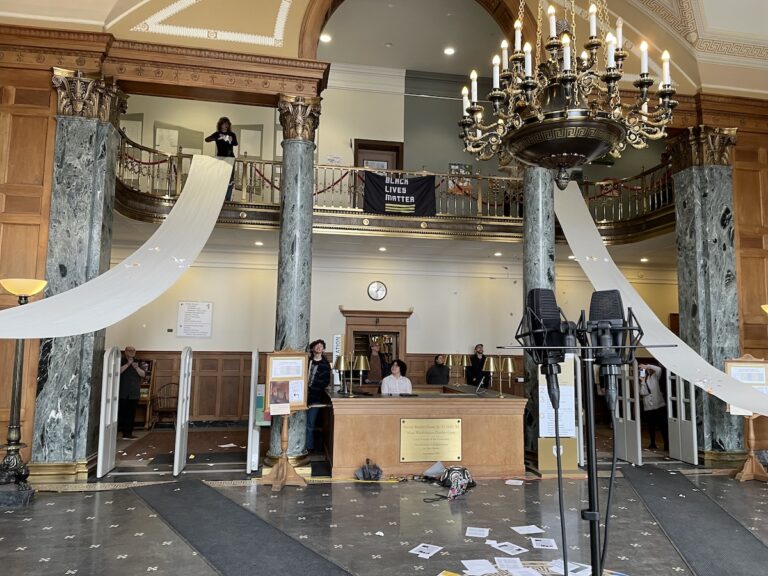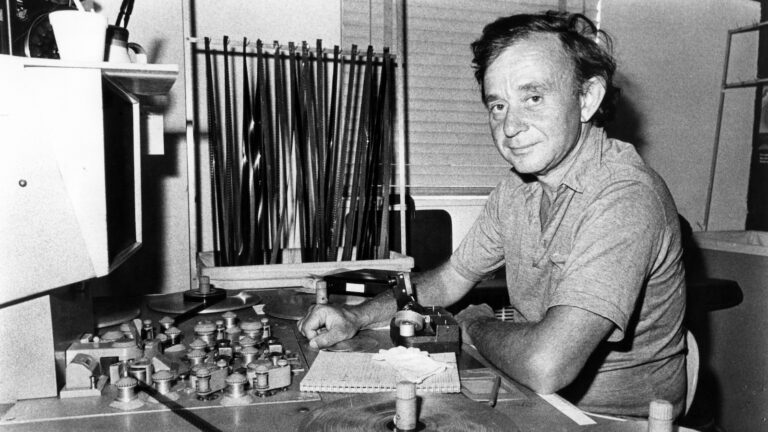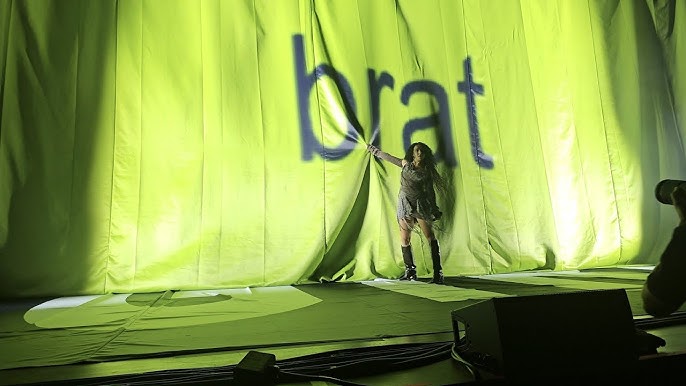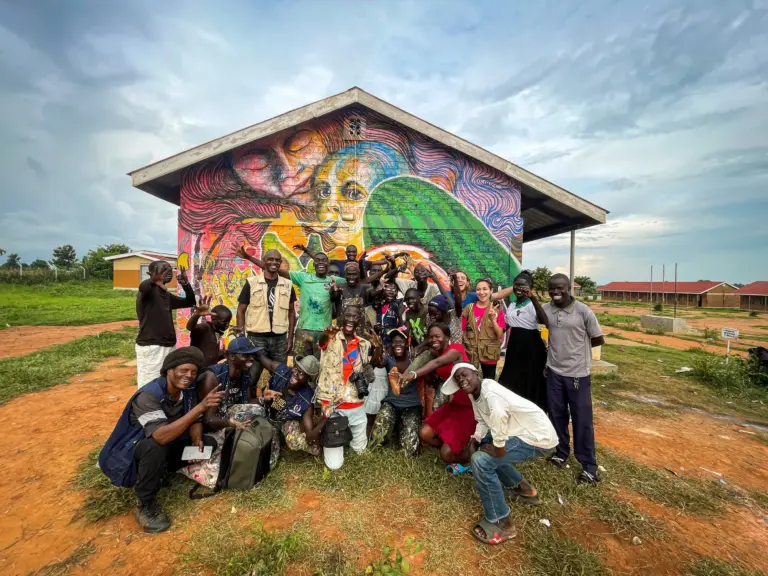“American Alien” Is Out of This World

On Friday, April 11 and Saturday, April 12, 2025, SHADES—the University’s student of color theater collective—presented “American Alien,” a romantic comedy written by Sida Chu ’26 and directed by Luna Kwon ’27. The play follows Lia Lin (Yumi Takahashi ’25), a recent graduate of an unnamed liberal arts college who agrees to work for an American citizen named Will Wood (Justin Atnes ’28). In exchange, Will marries Lia so that she can become a permanent resident of the United States. “American Alien” was an exciting watch, with its genre and style evolving from scene to scene. It seamlessly blended high-energy moments with deep, moving sequences in a nuanced exploration of self-image, immigration, and identity, wrapped up in the sweetest love story.
During the pre-show announcements, Takahashi shared that the show was dedicated to Parker Tey ’26, a vibrant force in the Wesleyan theater community who recently passed away. Takahashi expressed that the cast and crew hoped to honor Tey and their amazing work on campus, and had left a seat for them in the front row.
“This dedication was American Alien’s way of honoring Parker’s vivid presence and legacy throughout the theater community,” Takahashi wrote in a message to The Argus. “They were a good friend, mentor, and inspiration to this production and to so many people. One of the last conversations I had with them was when they visited campus right before spring break. They planned to visit again to see the show, but asked me to congratulate the team early because they never doubted that it would be successful.”
“American Alien” begins with Lia, over the moon about her new job, heading into an interview at United States Citizenship and Immigration Services (USCIS). She explains to the dogmatic and somewhat incompetent USCIS interviewer (Elijah Philip ’28) that she’s applying for an H-1B work visa, which her employer has agreed to sponsor so that she can work legally in the U.S.
The interview is cut short by a phone call from her new boss, revealing that the company cannot support her in obtaining the visa which they were supposed to sponsor because her college degree isn’t related to the job she was offered. Since they can’t sponsor her visa, the company also can’t hire her, as she won’t have a legal right to continue working in the U.S. Disappointed, jobless, and desperate to stay in the States, Lia quickly shakes off the bad news and determines that she’ll find a way to remain in the U.S. no matter what.
In a message to The Argus, Chu explained her inspiration for bringing Lia’s story to the stage.
“I wanted to write a story about international students and how it feels to navigate this country called America,” Chu said. “We don’t see [many] narratives about international students because most people who do theater are white and American, so the kind of narratives [and] characters that are represented—not just at Wesleyan, but in the theater industry as a whole—have leaned towards those kinds of stories.”
As a theater enthusiast, Chu sought to bring these overlooked experiences to the stage in a way that was accessible for all audiences.
“As a theater-goer, I don’t see myself that often on stage,” Chu said. “So I wanted to bring all these elements together in a fun, humorous, engaging way that was not too dense for someone who is not used to theater to digest.”
As an audience, we are brought into the world of the play through Lia’s eyes and made to understand the events in her life through a series of television and pop culture references. Lia, upbeat and quirky in Takahashi’s depiction, regales the audience with constant asides. Lia hosts her job search like a game show, imploring audience members to give her one of the brightly colored job offer slips that have been distributed by other cast members.
After a few rejected applications, Lia learns of an opening for a job as a chef at a local elementary school and gets the opportunity to interview in person and show off her cooking skills, which she hilariously embellished in her cover letter. At the interview, she meets Will, her would-be supervisor, whose endearingly awkward and robotic personality seems to be the complete opposite of Lia’s silly persona. The old adage must still hold true as, after a short back-and-forth in which Lia confides in Will about her sticky situation, it’s clear that the two are meant to be. Unfortunately, Will isn’t able to help Lia out, and she leaves dejected.

Back home, Lia and her team of other Lias—her internal critics played by Maggie Sun ’27, Ryan Wong ’27, Oleksandra Volakova ’27, and Olivia Kong ’28, who pop out every so often to help her navigate her complicated personal life and explain her inner monologue to the audience—demonstrate how she administers injections that she has to give herself daily, in the style of “Bill Nye the Science Guy.” After the other Lias explain the injection process—with some acting as flight attendants enacting the injection steps like a safety announcement, and others as strict schoolteachers disciplining audience members’ behavior—Lia converses with the audience, timidly sharing that she’s trans, without saying the word out loud, and that the injections are an essential element of her life.
Some time later, Will appears at Lia’s front door with a new proposal: If she agrees to work as his housekeeper, he will marry her so that she can get her green card. Deciding that the agreement is mutually beneficial and economically advantageous, the two head to the courthouse and tie the knot in a ceremony officiated by a voiceover recorded by President Michael Roth ’78.
After their wedding, the obstacles to Lia’s permanent residency seem to only increase. Will tries to navigate the outdated USCIS website (skillfully personified by Philip) to no avail, until Lia steps in to help. Adding to the tension of the situation, the other Lias question whether Will has any ulterior motives behind his offer to marry her.
Meanwhile, Lia and Will rehearse their love story, including a meet-cute, first date, and first kiss, so that they will be able to give the same story in an upcoming interview at USCIS. As they recite their fabricated history, the scenes of them falling in love are acted out by other cast members.
At the interview, the USCIS officers (also played by Sun and Wong) test them on the details of their relationship, asking increasingly invasive questions. For a tense moment, it seems the pair will fail in their efforts when they both hesitate when asked about their sex life, but they deliver the same answers (which the audience later learned they shared through discreet Bluetooth communication devices that were hidden from their interviewers).
When it seems like they’ve finally done it, the USCIS requests more documents from them, provoking Will to reach out to his estranged father and to ask Lia to reach out to her own family. After a heated argument, Lia reveals to Will that the reason she won’t reach out to her family, and the reason she can’t risk going back to Singapore, where she would get jailed for evading mandatory military service for legally male citizens, is because she’s transgender. She storms off and packs up to leave that night, thinking Will might get upset that she wasn’t transparent with him or, worse, that he won’t accept her for who she is.
Before she can leave, Will finds her and lets her know that he accepts her and that he’s developed real feelings over the course of convincing everyone else of their fake relationship. The play ends with the two admitting their feelings for one another and deciding to stay together as a real married couple.
As a first-time director, Kwon pulled off an engaging show with many moving parts like a pro. In an email to The Argus, she credited this success to the talented cast and crew that supported her through the process.
“The [directing] process was a lot of asking around, contacting people, and figuring stuff out, which also meant that I met so many passionate people who were willing to help and were excited to see the production come to life,” Kwon wrote. “This is a show about an international student that goes to a liberal arts college during a not-so-ideal political climate [so] a lot of us…felt like the show was about us. We sat down talking about our experiences during our Wesleyan career and how we feel, recurring thoughts and sentiments that visit us, such as guilt, fear, [and] annoyance, as well as hope, joy, and belonging. Those conversations guided me through what the show should be.”
Chu was overjoyed to see how both Kwon’s and the cast and crew’s energy and hard work brought her script to life.
“A lot of [the cast] are people I know through friends or met in classes who I know had an affinity for acting,” Chu said. “So I [was] really happy to see all of them shine. I felt a sense of vindication [because], at Wesleyan, [most] theater shows have majority-white casts, if not all-white casts. Some people might say that [people of color] or international students are not interested in [theater,] but they are interested in it, and they are very good at it.”
Despite the play’s focus on the international student experience, Chu emphasized her hope to create a universally relatable narrative.
“I had tried my best to kind of find poetry or humor [in] the mundane moments that everyone with any experience with bureaucracy and the internet today can relate to and find funny,” Chu said. “You know, those things [are] so trivial, so minute, and we have all gotten too used to them, but they are part of life and are not just limited to international students or to identity-based activities or cultures. Some things [in the play] are universal, like love, like longing for connection and a sense of belonging.”
Ultimately, Kwon hoped that audiences would find joy and fun in their work, even as it tackled topics that have been much larger concerns for many marginalized groups in today’s political climate.
“I [hope this show was] fun for the audience, [even though] behind that fun and nonsensical campiness is a [harsh] reality that some of us are facing,” Kwon wrote. “If they were able to notice that, that would make me happy.”
Chu agreed and added that she hopes that audiences, especially those made up of American citizens, will be able to view the situations of international students and other marginalized folks with a bit more empathy going forward.
“Do you want to see a play titled ‘American Alien’?” Chu said. “You don’t need to see my show. Just look outside [your] window at this world right now. [I want] to end with a call for all of my American peers at Wesleyan to have a little more empathy towards your international student friends…and treat us as human beings, not aliens.”
Sida Chu is an editor-in-chief for The Argus.
Sulan Bailey can be reached at sabailey@wesleyan.edu.








Leave a Reply